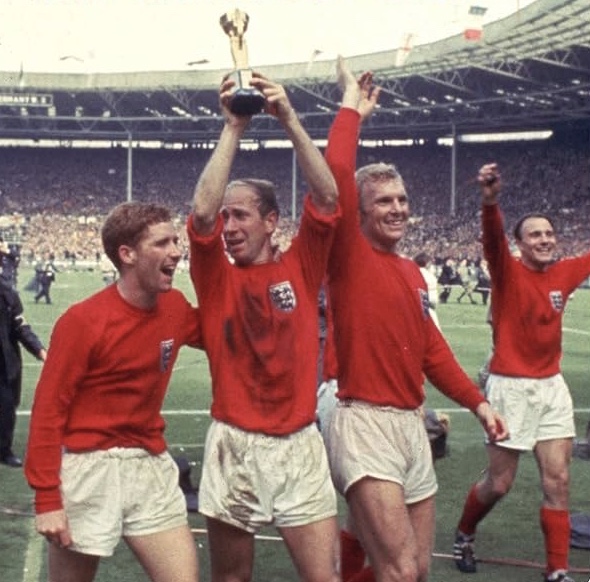BY Vince Cooper
Bobby Charlton had a glittering football career although his own self-effacing attitude and the talents of those around him, often and it seem to be in the shadow of others. The likes of Duncan Edwards, Jimmy Greaves, Denis Law, George Best, Bobby Moore and even Sir Geoff Hurst all appeared at times to eclipse him in terms of plaudits and even now those players are often remembered more fondly in the eyes of many. But Charlton proved time and again that he was a true great, scoring successes on the biggest stage and rarely found wanting when it mattered most.
Robert Charlton was born in Ashington, Northumberland on 11 October 1937. He had one older brother (Jack, of course) and two younger, Gordon and Tommy. Their dad Bob was a coal miner whilst mum Cissie was part of the famous footballing Milburn family. Four of her brothers were professionals whilst cousin Jackie – ‘Wor Jackie’, was an England international and is still idolised on Tyneside.
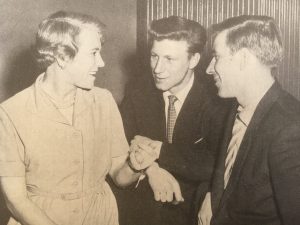
With mum Cissie and brother Jack
Whilst attending Bedlington Grammar School young Bobby was chosen to play for East Northumberland Schools and also for England Schoolboys. Spotted by scout Joe Armstrong he signed for Manchester United in 1953 as a 15-year-old with 12 other clubs reportedly interested in his signature.
The club were keen to take the youngster on as a member of the groundstaff but Cissie insisted that he signed as an amateur which would allow him to work as an apprentice electrical engineer and giving him a fallback should football not work out. But it did and he signed pro forms for United on his 17th birthday in 1954.
One of the famed ‘Busby Babes’, Charlton quickly progressed through the youth and reserve teams at the club, and was a member of three FA Youth Cup-winning teams before making his first team debut on October 6 1956, almost exactly two years after turning pro, against Charlton Athletic, scoring twice in a 4-2 win.
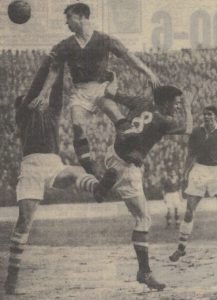
Scoring against Charlton
At the same time he was doing his national service with the Royal Army Ordnance Corps in Shrewsbury where he served with United teammate Duncan Edwards. Being based there meant that both could continue their footballing education and appear regularly for their club.
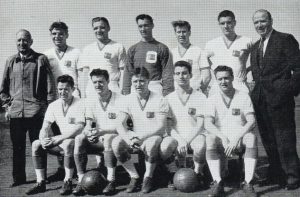
The 1957 Cup Final team
Charlton and the precocious Edwards, who had already played 33 times in the previous campaign, played key roles as Busby’s team retained their 1st Division title. Bobby made 14 league appearances and scored 10 times. The team were close to completing the double missing out in the FA Cup final to Aston Villa having lost goalkeeper Ray Wood when he was knocked out and had his cheekbone broken, and also reached the semi-final of the European Cup. There they met the mighty Real Madrid and after losing the first leg 3-1 in Spain, Charlton scored one of his team’s two goals in the replay which finished 2-2 meaning Real progressed, going on to retain their crown.
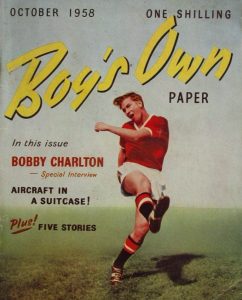
A Boy’s Own story
Things seemed to be going so well for Charlton, and United until 6th February 1958 when he lost eight of his teammates on a Munich runway. He recalled the awful way he found out, while in hospital, that he had lost so many friends. “This German lad was there and he had a paper”, recalls Sir Bobby who at 20 was the ‘baby’ of the team, “and he had a list of names. He read them out and if they were alive he said ‘yes’ and if they were dead he said ‘no’”
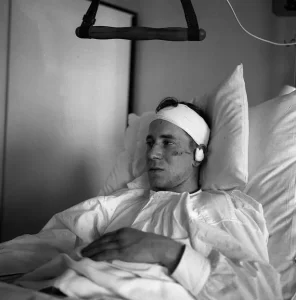 .
.
After Munich
Many hopes were pinned on Charlton as one of the few surviving ‘Babes’ and he made a rapid recovery, playing again in just three weeks, in an FA Cup 6th round match against West Brom.
Just over two months after the tragedy the youngster made his England debut against Scotland at Hampden Park and scored with a volley in the 66th minute, the third in a 4-0 win and a strike goal Scottish ‘keeper Tommy Younger called ‘the greatest ever scored at Hampden ‘. He would finish the season by playing in his second cup final and picking up his second runners-up medal as United battled bravely in the aftermath of the tragedy.
The England adventure continued with both goals in the 2-0 win over Portugal and he then played in a 5-0 defeat to Yugoslavia in Belgrade before making the squad for the World Cup in Sweden although he never got into a game with the selectors surprisingly preferring the hard-working but more static Derek Kevan.
Bobby scored a 29 goals in 38 games as United finished runners-up to Wolves in the 1958-59 season. On the international scene he appeared in five games for his country, scoring five times while also netting three in three under-23 appearances. He showed tremendous composure wherever he played, as well as the ability to hold off opponents, and that fierce shot that would become famous throughout football.
From then on he was an England regular. Rarely left out and often scoring, he was picked at different times at centre-forward, inside-forward and outside-left and wherever he played he was a threat to the opposition.
The knock on Charlton was that others worked harder at tracking back and there were some who felt that, as a Munich survivor, he was sometimes given special treatment. But his goal power was a consistent threat and in the fullness of time he would prove all the doubters wrong. Perhaps the biggest problem was that versatility which would often see him switching position, sometimes in the middle of important matches
In 1961 Bobby married Norma who he had met at an ice-rink two years before and they would later have two daughters Suzanne and Andrea.
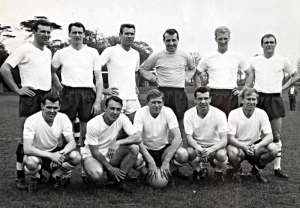
England 1962
Charlton started every game at the 1962 World Cup in Chile where England were knocked out in the quarter-final by eventual champions Brazil and, still only 24, had already won 39 caps when Alf Ramsey took over as manager in early 1963.
Ramsey famously promised that England would win the 1966 World Cup and it was clear from the start that Charlton would be an important part of his plans.
Although he often wore the number nine shirt during Ramsey’s reign he was often employed in a deeper role, surging up to join the strikers or showing his phenomenal shooting power from distance.
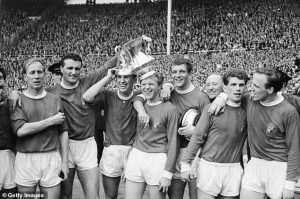
Cup winners 1963
At club level United, with Charlton top-scoring in two seasons, were close without actually winning anything until Matt Busby added Denis Law to share the load. In the 1962-63 season the team won the FA Cup, beating Leicester City in the final. Two seasons later, now with George Best also in the line-up they claimed the title beating Leeds United on goal average.
Despite being a key member of the national team there was one incident, in 1964, which might have brought a premature end to Bobby’s international career.
The squad had gathered at White’s Hotel in Lancaster Gate prior to departing on a tour of the U.S and South America. A 10:30 curfew was in place the night before departure and Charlton, along with Bobby Moore, Jimmy Greaves and two others missed it by an hour. When they went to their rooms all five found that their passports had been returned to them, left on their pillows.
The following morning Ramsey said he was trying to find replacements for the five who had ‘betrayed his trust’. Whether that was merely a threat we will never know but all the players went on the tour and learned the important lesson that Ramsey was not a man to be messed with.
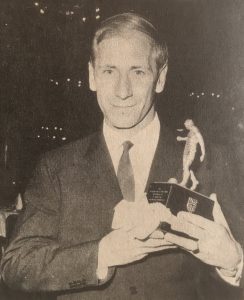
With the Footballer of the Year trophy
Even before the World Cup, 1966 was proving a good year for Charlton. He scored 18 goals in 36 league games with another two in cup matches as United finished 4th in the table and reached the last-four in both the FA and European Cups. At the end of the season he won both the Football Writers Association and European Footballer of the Year awards.
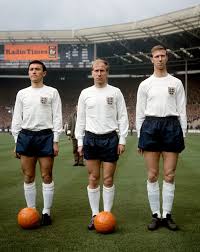
Lining up for his country with Terry Paine and brother Jack
The pinnacle of Charlton’s international career came, of course in 1966 and in the semi-final in particular it was he, more that anyone, who got England over the line. He scored both goals, one in each half, and outshone the great Eusebio.
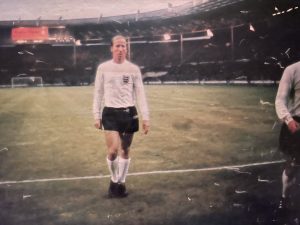
At half time v Mexico
In the first-half Charlton ‘passed’ the ball home after Roger Hunt had put pressure on Portugal goalkeeper Jose Pereira. In the second he was set up by Geoff Hurst, smashing home an unstoppable shot from 15 yards.
On his 74th start for his country Charlton picked up his World Cup winners medal. His performance in the final win would have quieted the critics from earlier in his career as, despite being closely marked by Franz Beckenbauer, he worked hard from midfield and covered plenty of ground.
In 1966-67 United, with Best now at his peak, again captured the 1sr Division title. Charlton was ever-present and found the net on 12 occasions.
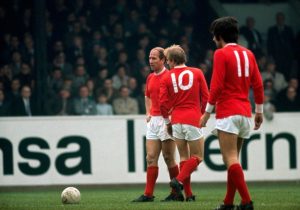
Charlton, Law and Best
This gave Bobby one more chance to claim the European Cup he had come so close to winning 11 years before and might well have won a year later were it not for the tragedy of Munich.
United saw off Hibernians of Malta, Sarajevo and Gornik Zabrze to reach the last four where they were paired with Real Madrid. After winning 1-0 at Old Trafford, they fell 3-2 behind on aggregate in Madrid but fought back to draw the match 3-3 and go through 4-3.
The final was at Wembley and was a rematch between Charlton and Eusebio, star of opponents Benfica and, for Bobby perhaps, as big an occasion as two years before
Missing the injured Denis Law, United took the lead after a goalless first-half when Charlton, who had failed to find the net in the run to the final, headed home a David Sadler cross. But Benfica found an equaliser through Jaime Graca and went close to winning late on when two saves by Alex Stepney from Eusebio drew applause from the Portuguese superstar and took the match into extra time.
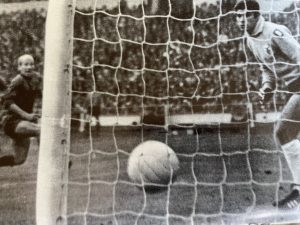
The goal against Benfica
In the extra period Matt Busby’s team finally put their opponents away. George Best restored the lead, Brian Kidd, on his 19th birthday, added a third and it was left to captain Charlton to round things off with the fourth, and then to go up and finally get his hands on the coveted trophy, the first time it had been won by an English team.
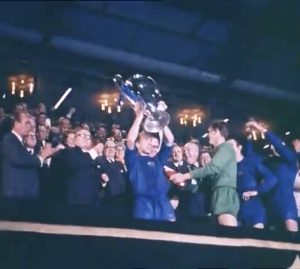
Lifting the European Cup
It must have been an extremely poignant moment for Charlton to ascend the Wembley steps and receive the coveted trophy with memories of events just over 10 years before no doubt h]in his mind.
Bobby, now the senior statesman, was still a key member of the United side and also of the England team, and would remain so until they went to Mexico in 1970 to attempt to retain their trophy.
Bobby started all three group game although he was substituted twice in the stiflingly hot conditions. In the quarter-final against West Germany England led 2-0. When West Germany pulled a goal back with 20 minutes remaining, Ramsey, in a move which later received criticism, sent Colin Bell on the replace Charlton to save him for the semi-final.
Of course that semi never came as the West Germans scored twice more, sending England home.
That was Charlton’s 106th game for his country, and was to be his last. He scored 49 times for his country.
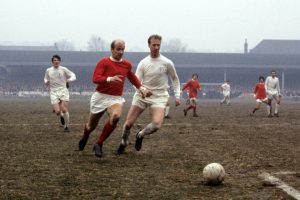
Up against brother Jack
But he continued to perform at a high level for his club, even though they were now in decline. After the European Cup win in 1968 he signed a massive eight-year contract at Old Trafford and would eventually retire in 1973 having made just over 600 league appearances for the club scoring 199 goals. The grand totals in all competitions is 748 games and 249 goals.
He then had short spells with Preston North End (where he was also manager for a while) and with Waterford United in Ireland.
Awarded a CBE in 1974, he was made Sir Bobby in 1994 and continued to serve Manchester United having been appointed to the board of directors in 1984.
In 2008 Sir Bobby was presented with the BBC Sports Personality Lifetime Achievement Award by brother Jack and he later had the South Stand at Old Trafford named in his honour.
Sir Bobby Charlton passed away on 21st October 2023. He was a truly great player and also a fantastic ambassador for the game of football as a whole as well as for his beloved Manchester United.
Of all of those great names listed at the start of this tribute who he was in the shadow of at one time or another, none won as many of the game’s top honours and Sir Bobby will forever be remembered as one of the finest footballers of his and any other generation.

